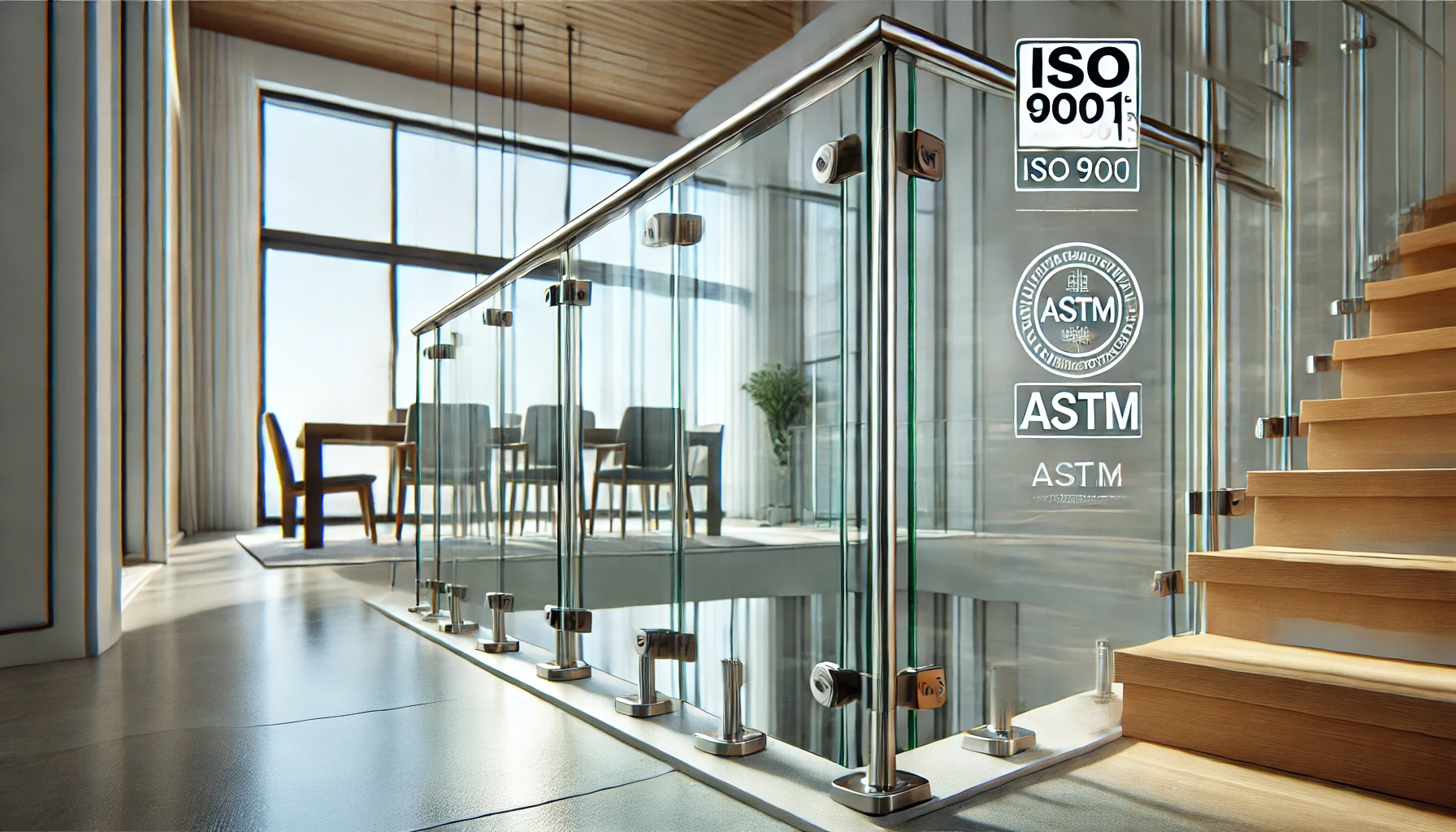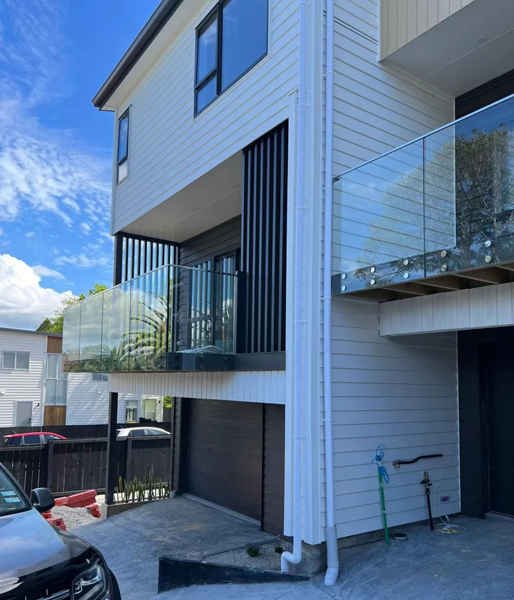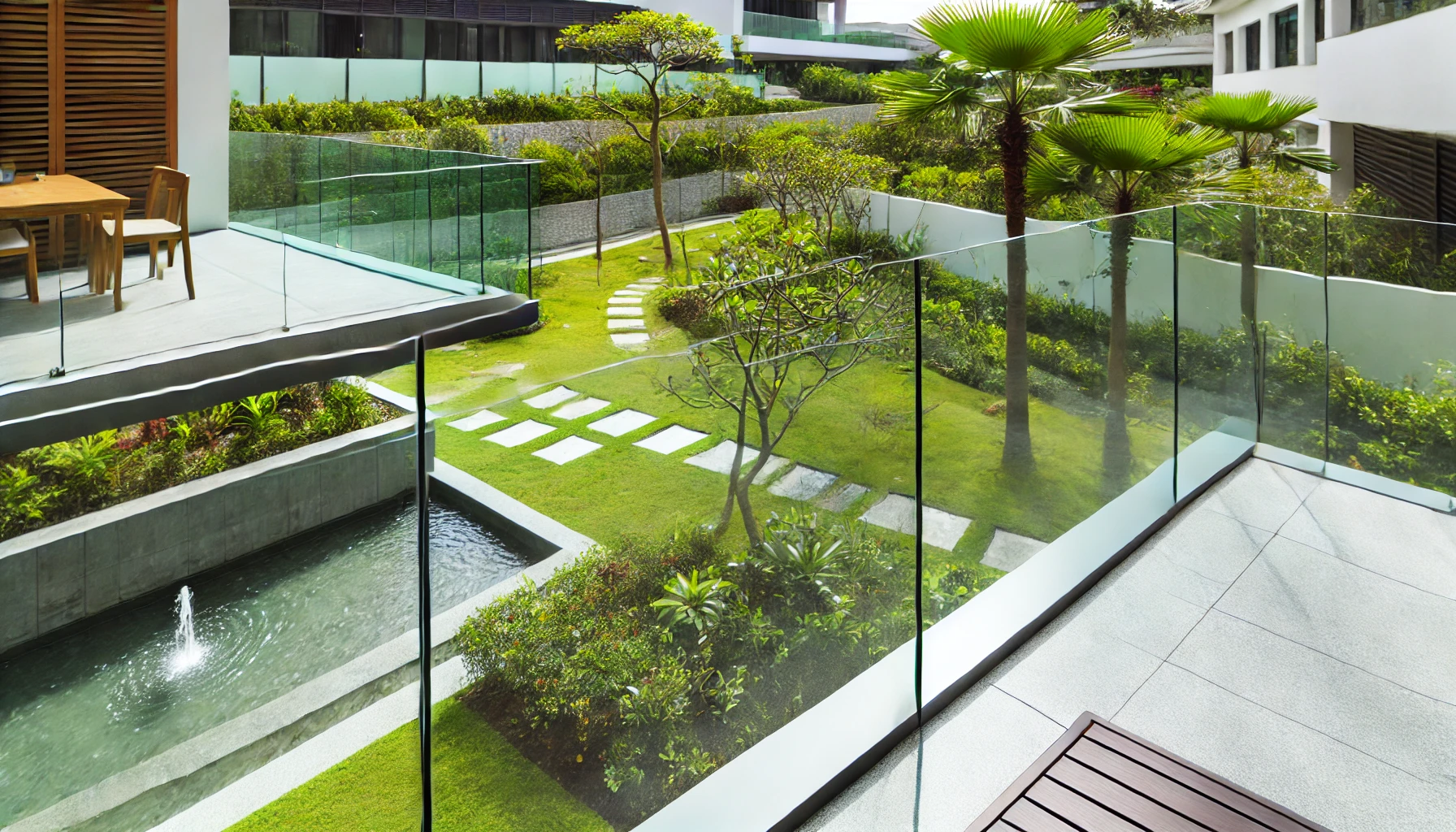Introduction
China has become a global leader in the manufacturing of glass railings, offering products that are not only competitively priced but also meet or exceed international quality standards. For customers around the world, the assurance that these products adhere to rigorous standards such as ISO (International Organization for Standardization), ASTM (American Society for Testing and Materials), and others is crucial. This article explores how Chinese manufacturers ensure that their glass railings meet these high standards, the certifications they achieve, and how these measures enhance customer confidence.
1. Adherence to International Quality Standards
Chinese manufacturers have made significant investments in technology, quality control processes, and skilled labor to ensure that their products meet international standards. Some of the key standards relevant to glass railings include:
a) ISO Standards
ISO standards are globally recognized benchmarks for quality, safety, and efficiency. Chinese glass railing manufacturers often adhere to several ISO standards, including:
- ISO 9001 (Quality Management Systems): This standard ensures that a company has a robust quality management system in place, focusing on consistent quality in production, customer satisfaction, and continuous improvement.
- ISO 14001 (Environmental Management Systems): This standard focuses on minimizing the environmental impact of manufacturing processes. For glass railing manufacturers, this could involve reducing waste, optimizing resource use, and ensuring sustainable practices.
b) ASTM Standards
ASTM standards are particularly important in the United States and cover a wide range of materials and products. For glass railings, key ASTM standards include:
- ASTM E2353 (Standard Test Methods for Performance of Glazing in Permanent Railing Systems, Guards, and Balustrades): This standard specifies the test methods for evaluating the performance of glass in railing systems, ensuring that the glass can withstand loads and impacts without failure.
- ASTM C1048 (Standard Specification for Heat-Strengthened and Fully Tempered Flat Glass): This standard sets the requirements for the strength and safety of tempered glass used in railings, ensuring that it meets the necessary safety and durability criteria.
c) EN Standards (European Standards)
For the European market, glass railings must comply with EN standards, which are recognized across the European Union:
- EN 12600 (Glass in Building – Pendulum Test – Impact Test Method and Classification for Flat Glass): This standard defines the impact resistance of glass, ensuring that it can withstand accidental impacts without causing harm.
- EN 14179 (Heat-Soaked Thermally Toughened Soda Lime Silicate Safety Glass): This standard specifies the requirements for thermally toughened safety glass that has undergone heat soaking to minimize the risk of spontaneous breakage.
2. Quality Control Processes in Chinese Manufacturing
Chinese glass railing manufacturers implement stringent quality control processes to ensure that their products meet these international standards. These processes typically include:
a) Raw Material Selection
The quality of raw materials is the foundation of any high-quality product. Chinese manufacturers source high-grade glass, metals, and other materials from reputable suppliers. The glass used is often tempered or laminated to meet safety standards, while metal components such as posts and brackets are made from corrosion-resistant materials like stainless steel or aluminum.
b) Manufacturing Precision
Advanced machinery and technology are employed in the manufacturing process to ensure precision and consistency. Automated cutting, polishing, and finishing processes help maintain tight tolerances, reducing the risk of defects. The use of CNC (Computer Numerical Control) machines, for example, allows for accurate cutting and shaping of glass and metal components, ensuring that they meet the exact specifications required by international standards.
c) Testing and Inspection
Before leaving the factory, glass railings undergo rigorous testing and inspection to ensure they meet safety and performance criteria. These tests may include:
- Load Testing: Ensures that the glass can withstand the required loads without cracking or breaking.
- Impact Testing: Simulates real-world impacts to ensure the glass will not shatter in a hazardous manner.
- Weather Resistance Testing: Ensures that the glass and metal components can withstand exposure to various weather conditions without degrading.
d) Certification and Compliance
Once the products have passed all necessary tests, they are often certified by third-party organizations. Certifications from organizations like SGS (Société Générale de Surveillance) or TÜV (Technischer Überwachungsverein) are common, providing an additional layer of assurance that the products meet international standards.
3. Advantages of Chinese-Made Glass Railings
There are several reasons why Chinese-made glass railings are competitive on the global stage:
a) Cost-Effectiveness
One of the primary advantages is the cost-effectiveness of Chinese manufacturing. High-quality glass railings can be produced at a lower cost due to the economies of scale and the availability of raw materials. This allows Chinese manufacturers to offer competitive pricing without compromising on quality.
b) Customization Options
Chinese manufacturers are known for their flexibility and ability to offer customized solutions. Whether you need specific glass types, unique designs, or particular finishes, Chinese suppliers can often accommodate these requests while still ensuring compliance with international standards.
c) Rapid Production and Delivery
With advanced manufacturing facilities and efficient logistics networks, Chinese manufacturers can produce and deliver large orders in a relatively short time. This is particularly advantageous for large-scale projects with tight deadlines.
4. Building Customer Confidence
For international customers, confidence in the quality and safety of glass railings is paramount. Chinese manufacturers build this confidence through:
a) Transparent Communication
Clear and transparent communication with customers is crucial. Chinese manufacturers often provide detailed specifications, test reports, and certifications to ensure that customers understand exactly what they are purchasing.
b) After-Sales Support
Many Chinese manufacturers offer robust after-sales support, including warranties, installation guidance, and maintenance advice. This support helps build long-term relationships with customers and ensures that any issues are promptly addressed.
c) Global Reach and References
Chinese manufacturers often have a global reach, with references and case studies from previous international projects. Sharing these success stories helps build trust and demonstrates the manufacturer’s ability to meet international standards on a large scale.
Conclusion
Chinese-made glass railings are designed and manufactured to meet or exceed international quality standards such as ISO, ASTM, and EN. Through stringent quality control processes, advanced manufacturing techniques, and a commitment to excellence, Chinese manufacturers provide high-quality, cost-effective products that are trusted by customers worldwide. By understanding these standards and certifications, customers can confidently choose Chinese glass railings for their projects, knowing they are getting products that meet the highest safety and performance requirements.







